Do sugar gliders stink?
You may have read stories about how smelly these cute critters are (they even rank among the stinkiest exotic pets)
Well, there are reasons for that musky aroma and- thankfully- ways to prevent it, too!
Keep reading to find out why do sugar gliders smell and how to get rid of the foul odor.
Table of Contents
Do Sugar Gliders Stink?
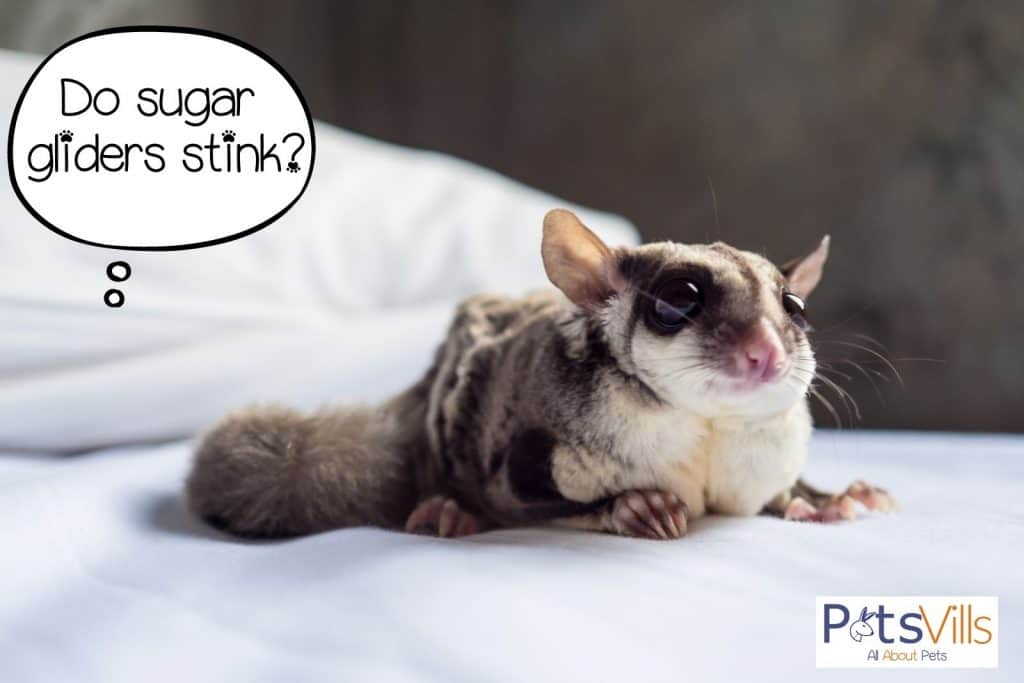
The short answer is, no, they shouldn’t.
But due to factors like incorrect diet, unclean cages, and scent marking, some may have an unpleasant odor. I will discuss these factors in detail later.
What Do Sugar Gliders Smell Like?
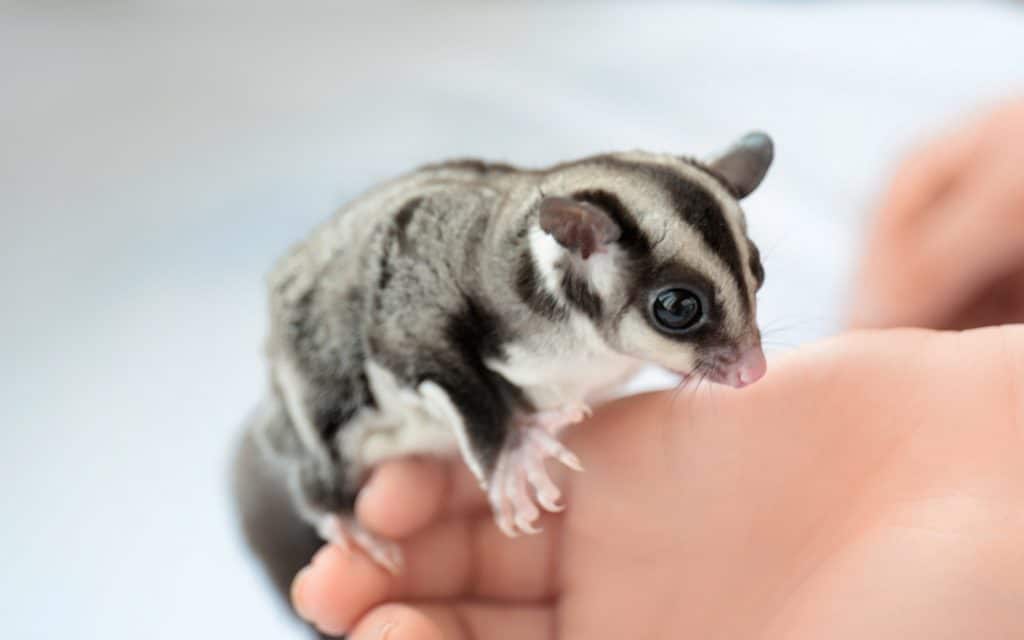
Like all other animals, sugar gliders have their distinct smell, which is not that bad.
It’s more of a mild musky smell which is often part of their physical and genetic makeup.
Both male and female sugar gliders have scent glands. Female sugar gliders, these glands are located at the pouch and genital area.
On the other hand, male gliders have scent glands in three areas; the head (appears as a bald spot), chest, and genital areas.
This explains why male sugar gliders may have a “stronger smell” than female sugar gliders.
Sugar gliders also have a unique foul smell as part of their defence mechanism.
When they are scared, they may produce this smell and a white fluid out of their private parts. But once you start bonding with them, this smell will disappear.
ALSO READ: How to Introduce Sugar Gliders to Each Other?
Why Does A Sugar Glider Stink?
Now let’s see why your sugar gliders may stink.
#1 Not Litter Trained
Like everyone else’s urine and feces, sugar glider’s urine and feces do stink. The smell is even worse for baby sugar gliders since their digestive systems are still developing.
If you don’t train them when and where to poop (more on this later), they may excrete in the cage, and it will be more challenging to clean, let alone get rid of the odor.
#2 Incorrect Diet
They are very sensitive to what they eat. It’s one of those sugar glider facts.
Even though sugar gliders should be fed proteins, feeding them too much of them (meats, insects, eggs) could make them smell like ferrets.
Acidic fruits, such as bananas, are other foods that could lead to diarrhea and foul odors.
#3 Scent Marking
As mentioned earlier, male sugar gliders have more scent glands, and their musky smell tends to be more prevalent, especially during the breeding season.
Another reason their odor may be more prevalent is that they are over-marking.
When you clean sugar glider cages thoroughly, you may eliminate all of their scent from the cage.
This makes them feel like they need to do it often to show that that’s their territory.
How To Prevent Sugar Gliders From Smelling
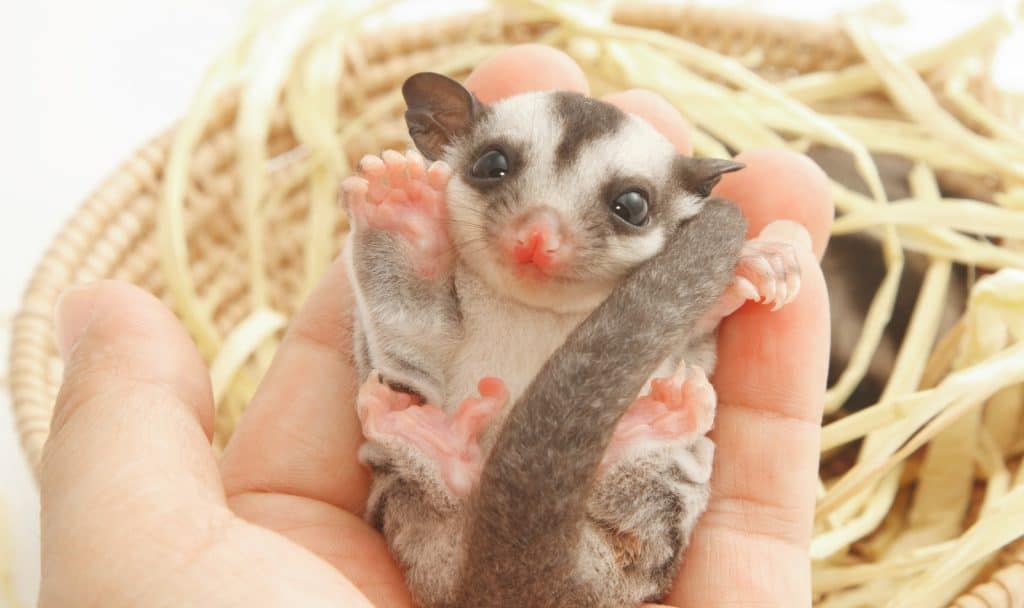
Below are some ways you can prevent your sugar gliders from smelling.
#1 Give them the proper nutrition.
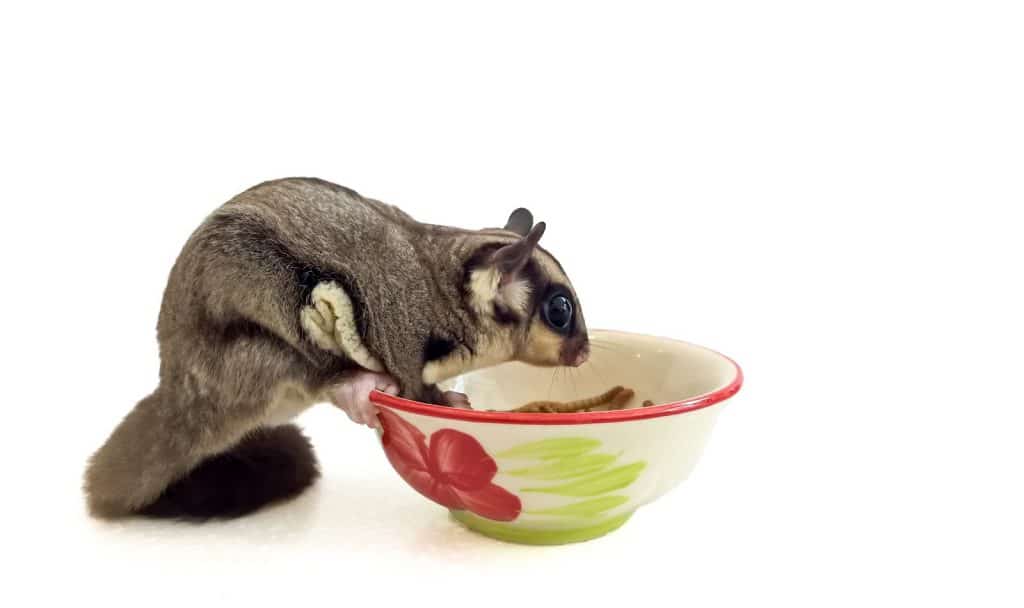
When in the wild, sugar gliders often feed on pulp from trees like eucalyptus or acacia, nectar, insects, fruits, and pollen.
As you can see, it’s hard to replicate this diet for captivity-raised sugar gliders.
But that doesn’t mean it’s not possible. What sugar gliders should eat or shouldn’t eat is also a very controversial subject.
You need to consult your vet on what to feed your pet and how much to feed them, especially now when several complicated diets are gaining popularity.
In our guide to sugar glider food recipes, we suggested the Leadbeater’s mixture, which combines boiled eggs, honey, apple juice, vitamin supplements, baby food, baby cereal, greens, and pellets.
But a diet that contains 50 to 75% approved pelleted food, at least 25% of fresh fruit or vegetables, and 25% of proteins (crickets, mealworms, eggs, cooked meat) would do.
Generally, a sugar glider’s diet should have a calcium to phosphorus ratio of 1 to 2:1. WebMD also recommends that you should feed your pet 15 to 20% of its weight.
Also, make sure they have access to clean, uncontaminated water daily.
Foods to avoid
Like in horses or bearded dragons, you should avoid feeding your sugar gliders vegetables rich in oxalates.
These include collard greens, Swiss chard, and kale. Other foods to avoid include;
- Foods grown with synthetic pesticides
- Chocolate
- Pears
- Beets
- Strawberries
- Raspberries
- Dairy
#2 Clean Your sugar gliders’ cage
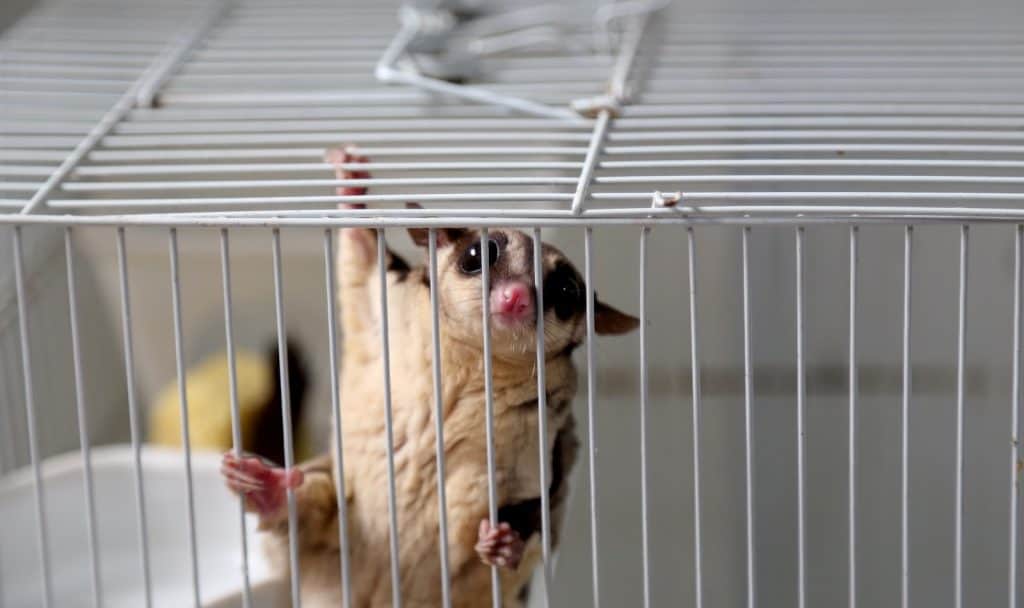
There are three ways to keep the sugar gliders’ cage clean;
1. Daily maintenance –
This is where you clean the feeding bowls, get rid of food leftovers, and replace the water with fresh water.
Clean the bowls, trays, and toys with hot water and soap, and sterilize them at least every 3 months.
2. Line the cages –
Place fleece, kiln-dried pine pellets, or any other safe materials in the bottom tray.
Doing this makes it easier to clean, and it also eliminates the odors in case your pets splash urine and feces in the cage. You can replace the linings every 2 to 3 days.
3. Deep Cleaning –
This is a thorough cleaning that you should do once every two weeks. It involves cleaning the cages with vinegar and hot water and rinsing.
Some sugar glider owners have claimed to have used Clorox, bleach, or other chemicals.
I don’t think that’s a good idea since these chemicals may be harmful to your pet. But a little dishwashing soap is fine.
The fleece pouches and any other cloth-like items can be washed in a washing machine.
To prevent the over-marking issue I mentioned earlier, wash the fleece, toys, or pouches at different times.
As long as some of the items have their scent, they won’t feel the need to do it again.
#3 Neutering Males
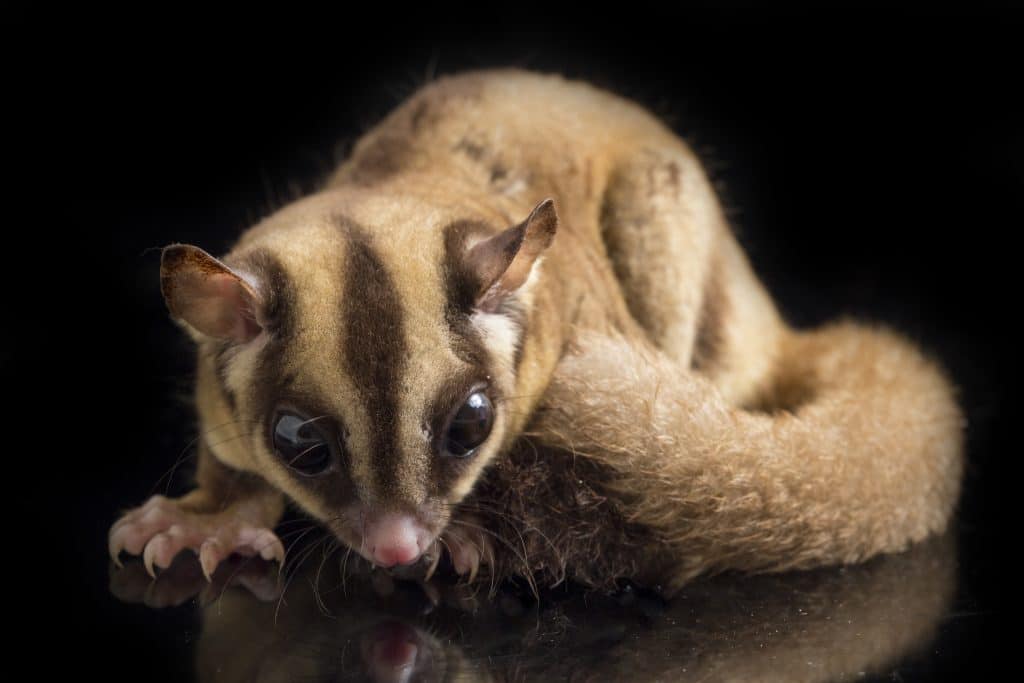
The only way to fix the strong smell of male sugar gliders is to get them neutered.
Unneutered males are more suitable for breeders.
#4 Litter Training Your Sugar Gliders
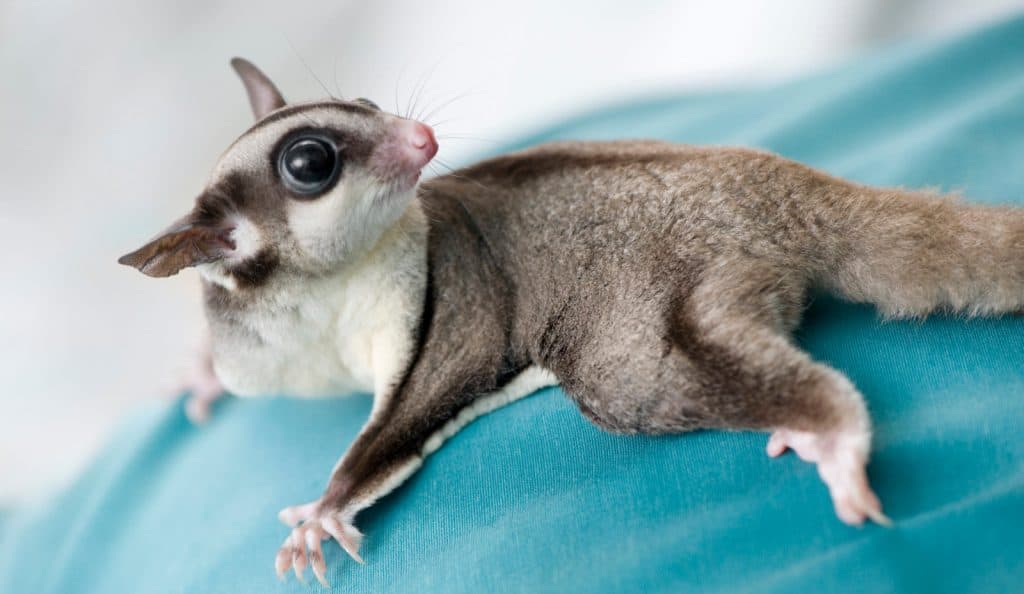
Sugar gliders can’t really be potty trained. Sugar gliders often have a “schedule” for going to the bathroom.
As long as you know their schedule, you will not have to deal with the odors.
For instance, sugar gliders go to the bathroom as soon as they wake up, and once they empty all the contents, they will not have to do it in the next 3 to 4 hours.
They don’t excrete in their sleep.
If you woke them up and they don’t want to go to the bathroom, you can stimulate them using baby wipes.
You do this by gently rubbing their genital areas with baby wipes. At first, they won’t like it, but they’ll eventually get used to it.
Your job is to train them that the only bathroom time is when you get them out of the cage or out of the pouch and at specific times.
You can even set a timer to alert you a few minutes before when you anticipate they might want to go to the bathroom.
Some sugar glider owners have reported being able to potty-train their sugar gliders by placing a litter box on one corner and placing some of the pet’s feces in it. You can go ahead and try that too and confirm if it works.
#5 Use an Air Purifier
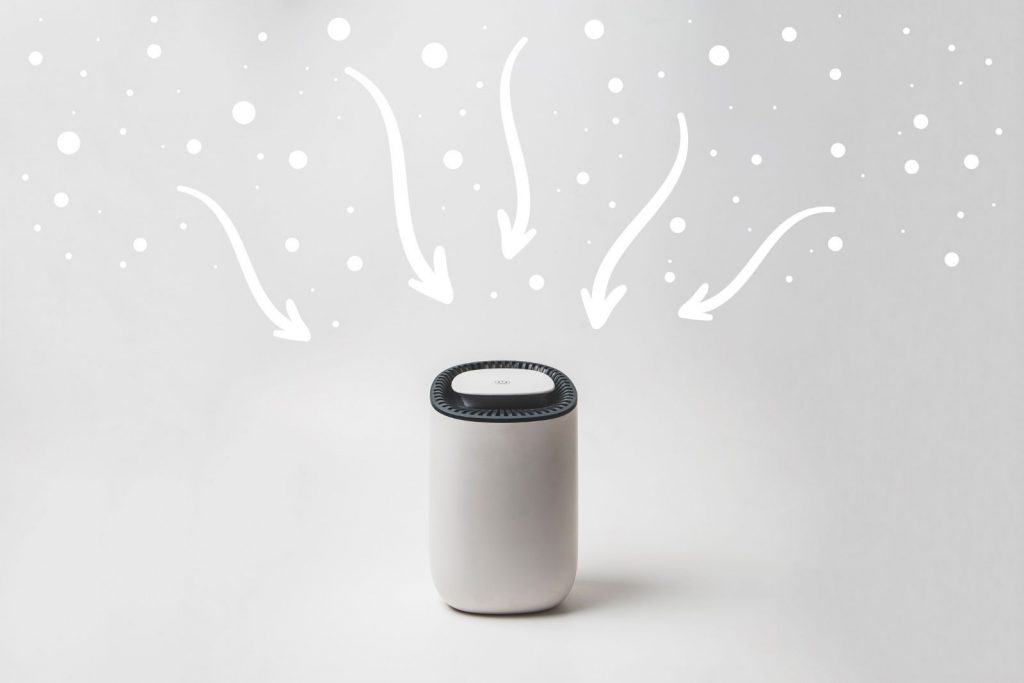
Even though sugar gliders don’t really stink, their poop will always stink.
So, there will often be a smell in the room where you keep your sugar gliders, especially during their bathroom time.
One of the ways to fix this is to get an air purifier.
This device helps remove contaminants and bad odors from your home, and they are very popular among dog and cat owners who may be allergic to dander.
A good air purifier for pet odor should have HEPA filters, which are very efficient in eliminating contaminants.
All you have to do is clean them or replace them after a few months. A good example is the LEVOIT air purifier.
#6 Use Pine Pellets For Odor Removal
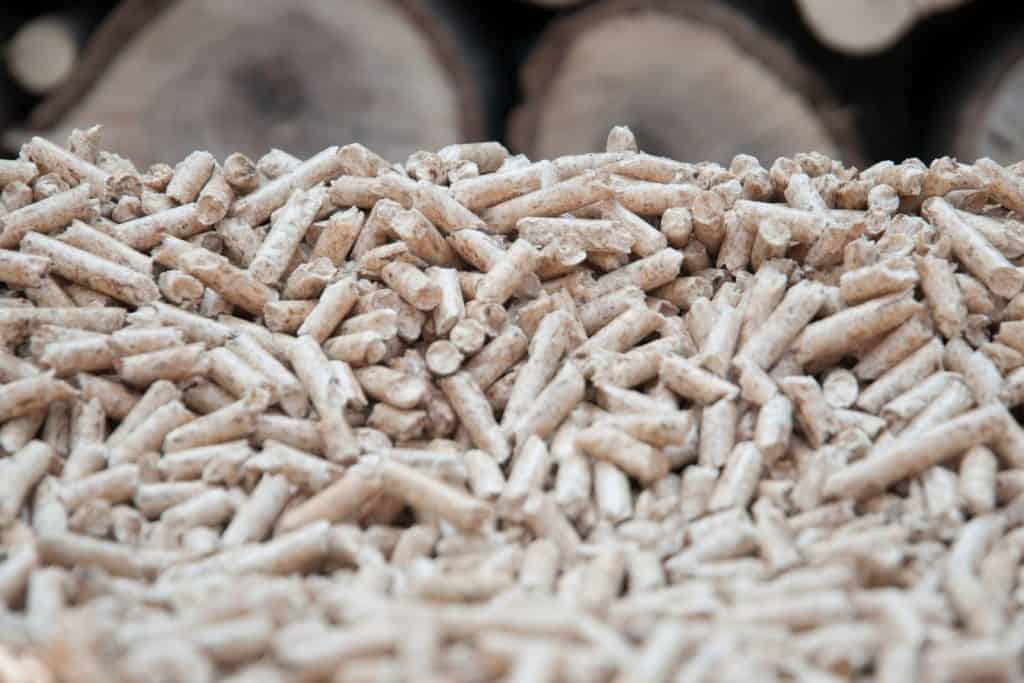
According to Amy Worden, pine pellets are quite effective in eliminating pet odor. And they make collecting waste from pets easier.
However, if you have pine trees around your home, don’t cut the leaves and twigs to place in the sugar glider cage.
This is because pine trees are toxic to sugar gliders, and they could harm them if they ingested them.
The reason the pellets are safe is that they are kiln-dried. Ensure the sugar glider cage has a grate or tray below it where you can place the pellets.
If it doesn’t, you can place a pan below the cage, depending on the type of cage you have.
Do Sugar Gliders Smell FAQS
Why Does My Sugar glider Smell Like Skunk?
Your sugar glider could be emanating a foul smell due to feeding him/her the wrong foods. Secondly, if they’re not litter trained, they may pee and poo anywhere, causing them and their cage to stink. And lastly, male sugar gliders may be over-marking their territories.
Do Sugar Gliders Smell Like Ferrets?
Not really. Sugar gliders have their natural musky smell, which is tolerable. But feeding them a poor diet and failing to neuter the males may make them smell like ferrets, or even worse.
How do I stop my sugar glider from smelling?
Start by feeding them the correct vet-approved diet. If you’re not planning to breed sugar gliders, it’s best to neuter the males. You should also make a habit of cleaning the cage, the pouches, toys, and all other items your sugar glider uses regularly.
Should I bathe my sugar gliders?
Can you give sugar gliders a bath? Sugar gliders are very clean animals, capable of grooming themselves unless they’re sick. So, bathing them regularly is not necessary. But if you note urine, feces, and other debris stuck in their fur, and they can’t get it out, you can clean them with some warm water and baby shampoo.
Conclusion
Sugar gliders can stink really badly if you don’t maintain them properly. But as we’ve established in this article, they don’t have to stink.
Their natural smell is a mild musky odor that most people can handle.
Ensure you feed them the right foods, neuter the males, and keep the cages and all their items clean.
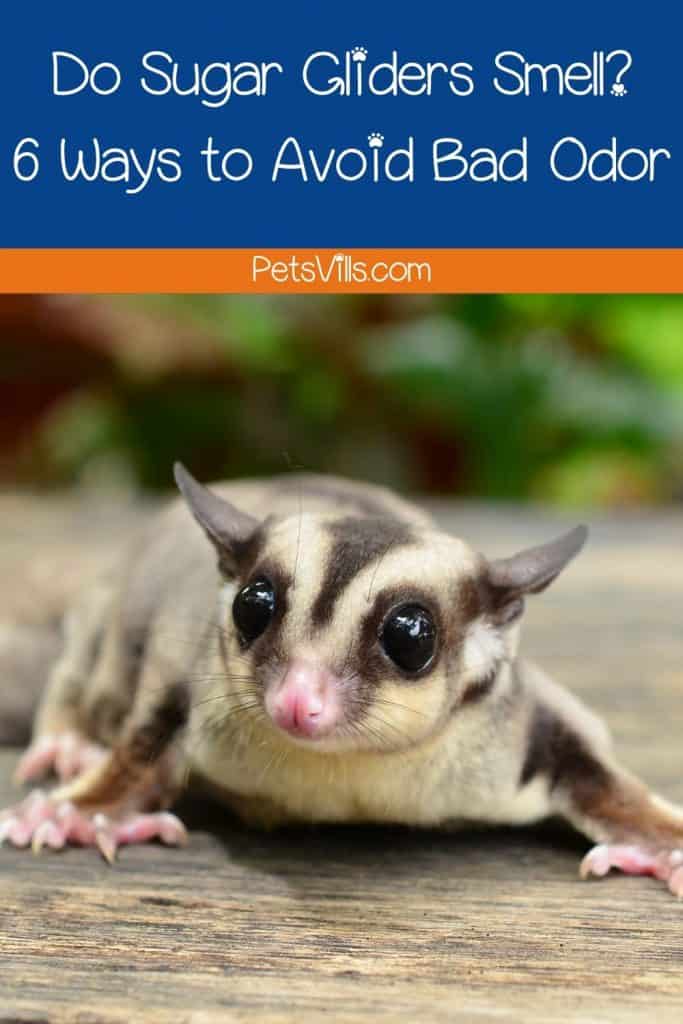
Does your sugar glider stink? What do you do to prevent it? Share with us your experience below!
Barry Stingmore is a British content writer living in Fuerteventura, Spain. An animal lover at heart, he shares his home with a dog and four rescue cats and has a passion for writing about animals big and small.
Barry loves finding answers to your animal-related questions, the more research involved the better! You can rely on him to find the facts.
Find him on FACEBOOK, TWITTER AND Linkedin
Read his latest ARTICLES.
Find more about him HERE.

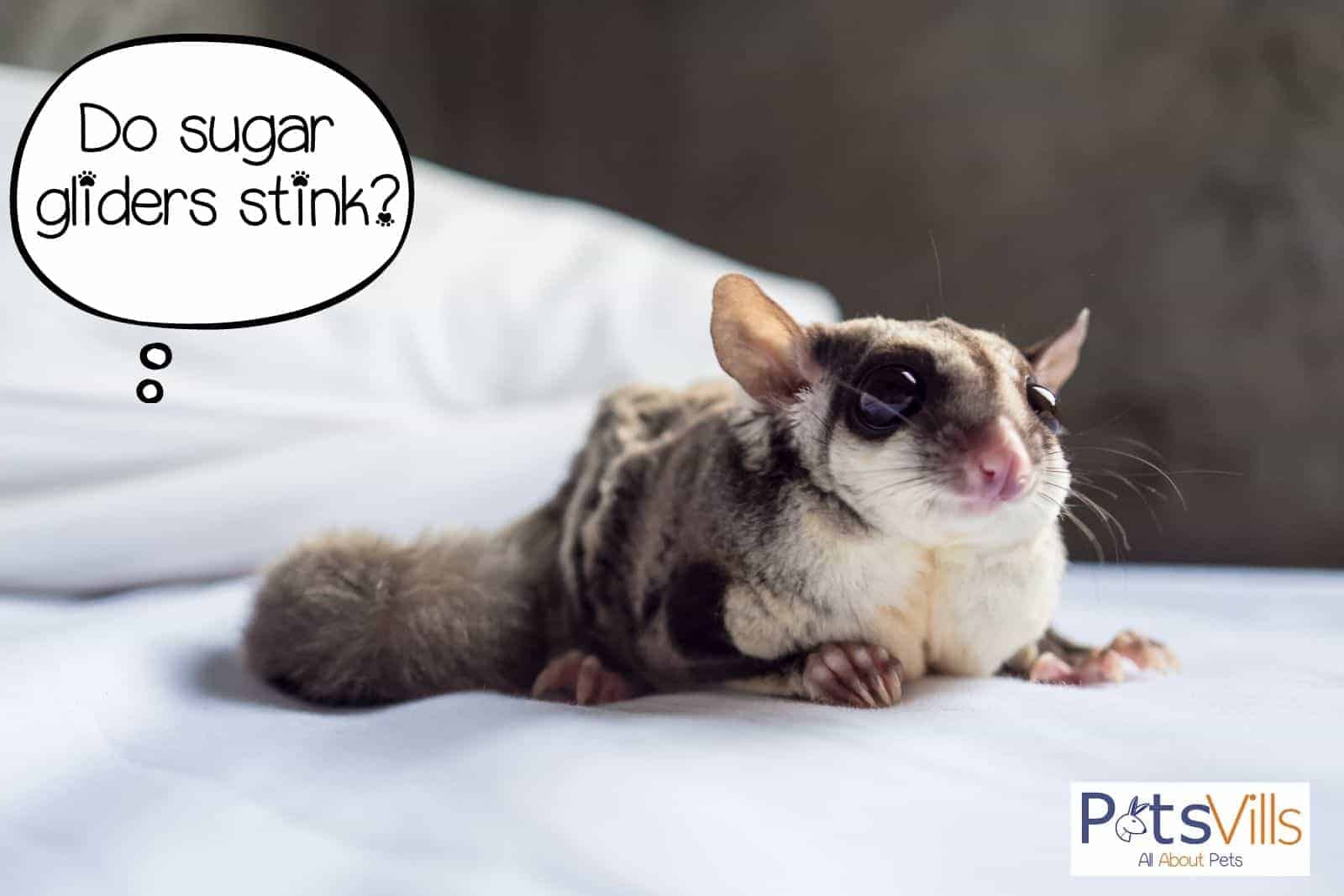


![Cute Sugar Glider Drinking From The Bottle [Must-Watch Video]](https://petsvills.com/wp-content/uploads/2022/09/Cute-Sugar-Glider-Drinking-From-The-Bottle-Must-Watch-Video-211x150.jpg)
